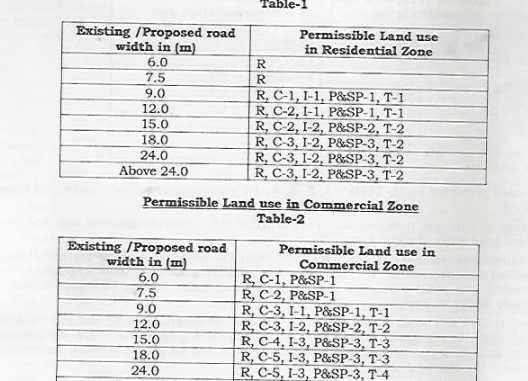Urban Development Department in Karnataka published a draft notification of Common Zoning Regulations a few days ago. Once implemented, it is applicable all over the state in all cities, and overrules the Bengaluru Development Authority (BDA) master planning rules. Here’s a snapshot that explains how residential areas are going to change once this comes into force. Basically the rule reduces the roadwidth in residential areas of Bengaluru from 45 to 30 feet, to accommodate the daily use category of commercial establishments like milk booths, newspaper stalls etc.

New guidelines for residential and commercial areas proposed under Common Zoning Rules
The notification has not gone well with the citizen groups fighting commercialisation of residential areas. Citizen groups have voiced several objections to the proposed regulations, especially to the part that links road width and commercialisation, and allows commercialisation of smaller roads. Here is where the new zonal regulation fails to do justice:
- One rule for across the state of Karnataka is the absolute opposite of good town planning practice. Town planning is about understanding the characteristics of a town and coming up with an approach that suits that city , not a universalised view. Bengaluru city for example is characterised by wide roads. To mix this with the same category as Koppal or Bagalkot makes a mockery of the process.
- The commercialisation/Zoning rules contradict the objects of Zoning stated in the rules itself. If the objective of zoning is the orderly development of the city, then that objective has been given the go by during this process.
- The gazette notification appears to be a way to circumvent well-established verdicts in courts to protect residential neighbourhoods. And it is therefore pandering to a builder /trader lobby. For instance, the present avatar of Revised Master Plan-2015 is a result of the petitions by citizens in WP 3676/2008 which resulted in a judgment directing Bengaluru Development Authority (BDA) to amend the zoning regulations.
- For such drastic change of rules, there has to be a justification /study done. UDD appears to have no basis for these new rules. No attempt has been sought to be made to even explain the rationale for the exercise.
- When it has already been demonstrated time and time again, that there is no will or mechanism to enforce any Zoning laws, any new laws without clarity on how rules will actually be implemented is meaningless. This principle has been upheld by the Supreme Court which just recently stayed the Akrama Sakrama scheme of the Government.
- As usual the new rules are silent in what action will be taken against violations of the proposed New zoning regulations. Needless to say, the status of the violators of the earlier zoning Regulations is unclear. Would they all stand regularized? Would that not be a direct violation of the interim orders of the Supreme Court in the Akrama Sakrama matter?
See the full version of the draft of the gazetted document here. Objections to the notification can be emailed to dtpkar@hotmail.com or sent by post to Director, Town and Country planning department, MS Building, Gate-04, Bengaluru-560001, before July 30th, 2017.